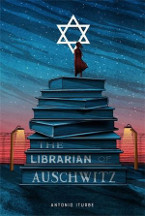The librarian of Auschwitz by Antonio Iturbe

Translated by Lilit Zekulin Thwaites. Pan Macmillan, 2018. ISBN
9781250217677
(Age: 14+) Recommended. Historical fiction. Based on a true story,
this novel recounts the life of Dita, a 14 year old Jewish Czech
girl, sent with her mother and father by the Nazis in Prague, first
to the Jewish ghetto of Terezin, and then to the Auschwitz
extermination camp. There, in Block 31, she becomes the librarian,
guardian of a secret library of eight books, a strange assortment
that has been secreted into the camp one by one: there is an atlas,
a book of geometry, H. G. Wells' history of the world, a Russian
grammar, a French novel, a Russian novel, Freud's treatise on
psychoanalytic therapy and a disreputable Czech publication The
adventures of the good soldier Svejk. The books are forbidden,
and they become the most valuable link with another world, the world
of literature and education. Dita literally guards them with her
life.
Life in Auschwitz is miserable and fearful. The school that their
inspirational leader Fredy Hirsch has set up in Block 31 is
threatened at any moment by discovery by the Nazis. The cruel and
heartless Dr Josef Mengele has Dita in his sights, he is tracking
her every move. Afraid, Dita doesn't know who to trust - is it truly
as the eccentric Professor Morgenstern says, your best friend is
only yourself?
Despite all the horrors she experiences, Dita is a survivor, and in
this story Iturbe captures her unique spirit, her courage in the
face of the worst evils, and her determination not to be beaten. The
book includes other truly brave people, a reminder of the strengths
of ordinary people living in the worst of times.
In the end this is an uplifting book, a reminder of the importance
of literature and ideas, and of empathy and shared human experience.
Young readers and adults would equally enjoy it.
Helen Eddy